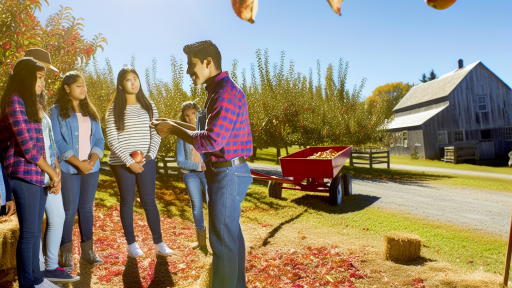Introduction to Youth Agriculture and Its Importance
Youth agriculture plays a vital role in shaping future food systems.
It promotes awareness of sustainable farming practices among young people.
Furthermore, it builds appreciation for the agricultural sector’s challenges and opportunities.
Boosting Engagement in Farming
Youth programs create hands-on experiences for students interested in farming.
Through these programs, students learn valuable skills.
Skills include planting, harvesting, and managing crops effectively.
These experiences encourage future generations to pursue agricultural careers.
Promoting Sustainability
Engaging youth in agriculture fosters a commitment to sustainability.
Young people learn about eco-friendly farming methods.
Such methods include organic farming and water conservation techniques.
This knowledge empowers students to make responsible choices in agriculture.
Building Community Connections
Youth agriculture programs connect students with local farmers.
These connections deepen youth understanding of local food systems.
Additionally, it encourages young people to support local economies.
Through these interactions, students gain mentorship and guidance.
Transform Your Agribusiness
Unlock your farm's potential with expert advice tailored to your needs. Get actionable steps that drive real results.
Get StartedEncouraging Healthy Lifestyles
Working in agriculture promotes healthy eating habits among youth.
Students gain firsthand knowledge of where food comes from.
This understanding leads to increased interest in fresh, local produce.
Moreover, youth participation in farming can reduce food waste.
Fostering Leadership Skills
Youth agriculture initiatives nurture essential leadership qualities.
Students learn teamwork and problem-solving skills through projects.
They also develop confidence as they present their work.
Ultimately, these programs prepare students for future roles in the industry.
Overview of School Agricultural Programs
School agricultural programs play a crucial role in youth education.
They provide students with hands-on experience in farming and food production.
These programs foster a connection between students and the agricultural industry.
Moreover, they promote sustainable practices and environmental stewardship.
Types of School Agricultural Programs
Various types of programs exist across educational institutions.
For example, Future Farmers of America (FFA) enhances leadership skills.
4-H clubs focus on hands-on learning and project development.
Agriculture classes offer curriculum-based knowledge and skills.
These programs can be found in both urban and rural settings.
Benefits of School Agricultural Programs
School agricultural programs offer numerous benefits to students.
First, they teach essential life skills like responsibility and teamwork.
Next, they encourage healthy eating habits and food awareness.
Additionally, these programs create pathways for future careers in agriculture.
Finally, they help develop a community connection through local food systems.
Community Involvement and Support
Community partnerships enhance the effectiveness of these programs.
Local farms and businesses often provide resources and funding.
Showcase Your Farming Business
Publish your professional farming services profile on our blog for a one-time fee of $200 and reach a dedicated audience of farmers and agribusiness owners.
Publish Your ProfileFurthermore, volunteers contribute their time and expertise.
These collaborations enrich the educational experience for students.
Consequently, community engagement strengthens local agricultural initiatives.
Benefits of Integrating Agriculture in School Curricula
Enhancing Practical Skills
Integrating agriculture provides students with essential life skills.
They learn about responsibility through caring for plants and animals.
Moreover, students develop problem-solving abilities in real-world scenarios.
Fostering Environmental Awareness
Students gain insight into sustainable practices through agricultural education.
This awareness promotes a stronger connection to the environment.
As a result, students become advocates for eco-friendly initiatives.
Encouraging Healthy Eating Habits
Incorporating agriculture into the curriculum promotes healthy lifestyles.
Students learn the importance of fresh produce and nutrition.
Additionally, they develop a greater appreciation for local foods.
Building Community Connections
Agricultural programs connect students with local farmers.
This interaction fosters a sense of community and collaboration.
Students can also engage in community service through agricultural initiatives.
Preparing for Future Careers
Exposing students to agriculture introduces them to various career paths.
They can explore roles in farming, research, and food production.
Furthermore, this exposure builds interest in agricultural sciences.
Promoting Academic Achievement
Participating in agricultural programs enhances student engagement.
This involvement often leads to improved academic performance.
Additionally, hands-on experiences reinforce learning across subjects.
Find Out More: Farm-To-Table Ethical Supply Chain
Engaging Students Through Hands-On Agricultural Activities
The Importance of Practical Learning
Practical learning enhances student engagement in agriculture.
Hands-on activities create a connection between theory and practice.
Additionally, students gain valuable skills through direct experiences.
Type of Activities
Schools can introduce various agricultural activities for students.
Gardening projects are a great starting point for many schools.
These projects may include vegetable gardens or flowerbeds.
Field trips to local farms also provide rich learning experiences.
Workshops on planting, harvesting, and cooking foster cooperation.
Benefits of Hands-On Learning
Hands-on activities promote teamwork among students.
They encourage critical thinking and problem-solving skills.
Moreover, students develop a sense of responsibility for their projects.
These experiences often ignite a lifelong interest in agriculture.
Community Involvement
Engaging local farmers can enhance school programs.
Farmers may volunteer their time and expertise for workshops.
Community partnerships create a network of support for educators.
Local businesses can sponsor agricultural projects or events.
This involvement strengthens connections between schools and the community.
Assessing Student Engagement
Teachers can assess student engagement through observations.
Showcase Your Farming Business
Publish your professional farming services profile on our blog for a one-time fee of $200 and reach a dedicated audience of farmers and agribusiness owners.
Publish Your ProfileSurveys can measure students’ interest in agricultural topics.
Cumulative projects allow students to showcase their learning.
Feedback helps improve future agricultural programs.
Explore Further: CSA Membership Essentials for Farmers
Potential Partnerships with Local Farmers and Agricultural Organizations
Building Collaborative Relationships
Forming collaborations with local farmers enriches school agriculture programs.
Schools can tap into the expertise of nearby farmers, fostering hands-on learning.
Farmers can provide guidance on sustainable practices tailored to the local environment.
This partnership enhances students’ understanding of modern agricultural methods.
Educational Workshops and Demonstrations
Local farmers can lead workshops demonstrating essential farming techniques.
These workshops can cover topics such as crop rotation, irrigation, and organic farming.
Students gain practical knowledge from professionals actively engaged in agriculture.
Moreover, demonstrations can be integrated into the school’s curriculum for better learning outcomes.
Field Trips and Experiential Learning
Organizing field trips to local farms can provide valuable experiential learning opportunities.
Students experience agriculture firsthand, deepening their appreciation for the industry.
Interactions with farmers allow students to ask questions and observe various farming methods.
These experiences can spark interest in agricultural careers among students.
Support from Agricultural Organizations
Partnerships with agricultural organizations can enhance school programs significantly.
Organizations often offer resources, educational materials, and funding opportunities.
They may also facilitate connections with industry experts and experienced farmers.
These supports help schools develop robust agricultural curricula benefiting students.
Community Engagement and Support
Engaging with the community can generate additional support for agriculture programs.
Farmers’ markets and agricultural fairs can be platforms for collaboration.
Families can participate, fostering a community interest in youth agriculture.
Support from local businesses can help sustain ongoing agricultural initiatives within schools.
Gain More Insights: Community Supported Agriculture Benefits For Farmers

Funding Opportunities for Youth Agriculture Programs
Federal Grants
The federal government offers various grants for youth agriculture programs.
These grants aim to enhance agricultural education and youth involvement.
Programs like the National Institute of Food and Agriculture (NIFA) support innovative projects.
Additionally, the USDA provides funding through programs like 4-H and Future Farmers of America (FFA).
State-Level Support
Each state has unique funding options for youth agriculture initiatives.
State departments of agriculture often allocate budgets for educational programs.
Reach out to local agricultural organizations for more tailored opportunities.
These organizations frequently collaborate with schools to secure funding.
Nonprofit Organizations
Many nonprofit organizations support youth agriculture through grants and donations.
For example, the American Farm Bureau Foundation offers various funding opportunities.
Local nonprofits may also provide micro-grants for specific projects.
Engaging with these organizations can lead to partnerships and additional resources.
Corporate Sponsorships
Corporations interested in community engagement often sponsor youth agriculture programs.
Seeking partnerships with agricultural businesses can enhance funding potential.
In addition, companies may offer resources such as equipment or training.
Showcase Your Farming Business
Publish your professional farming services profile on our blog for a one-time fee of $200 and reach a dedicated audience of farmers and agribusiness owners.
Publish Your ProfileEstablishing connections in the industry can yield significant benefits for programs.
Crowdfunding Initiatives
Crowdfunding platforms allow programs to raise funds directly from the community.
Many successful agricultural projects have emerged from crowdfunding campaigns.
Promoting these initiatives on social media can attract wider support.
Clearly articulating goals and impact will encourage donations.
Explore Further: Enhancing Farm Visits with Agri-Tourism Activities
Success Stories: Case Studies of Effective School Agriculture Programs
Urban Roots Program in Austin
The Urban Roots program empowers youth through agriculture in urban settings.
It provides hands-on experience in farming and leadership.
Participants learn to grow fresh produce while developing teamwork skills.
Furthermore, interns receive professional training in sustainability and business.
The program has successfully increased food access within the community.
School Garden Initiative in California
California’s School Garden Initiative connects students with their food sources.
This program creates gardens in schools across the state.
Students actively participate in planting and harvesting crops.
Additionally, they integrate science and nutrition education in the process.
The initiative has developed strong community support and engagement.
Farm-to-School Network in Oregon
The Farm-to-School Network enhances education about healthy eating.
Schools partner with local farmers to provide fresh produce to students.
This engagement increases awareness of local agriculture and nutrition.
Students frequently visit farms to see where their food comes from.
The program fosters important connections between students and local food systems.
Greenhouse Project in New York
The Greenhouse Project introduces hydroponics into school curriculums.
This innovative approach teaches students about modern agricultural techniques.
Students grow vegetables in a controlled environment, maximizing yield.
Additionally, they gain valuable skills in STEM fields through gardening challenges.
The project has inspired participants to explore careers in agriculture and science.
Agri-Science Programs in Florida
Florida’s Agri-Science programs combine academic learning with practical applications.
Students engage in various agriculture-related projects and competitions.
This hands-on experience fosters problem-solving and critical thinking skills.
Sponsors often reward high-performing students with scholarships and internships.
The initiatives have led to increased interest in agricultural careers.
Challenges and Solutions in Implementing Agriculture in Schools
Identifying Common Challenges
Many schools face funding limitations when considering agriculture programs.
The lack of trained staff often hinders the successful integration of agricultural education.
Additionally, school curricula may not prioritize agriculture as a necessary subject.
Geographic constraints also impact the practicality of implementing these programs.
Overcoming Funding Limitations
Schools can seek grants from local agricultural organizations.
Collaboration with local farms provides opportunities for shared resources.
Additionally, community fundraising efforts can help generate necessary funds.
Partnerships with local businesses can result in sponsorships for agriculture initiatives.
Addressing Staff Training Needs
Professional development workshops can equip teachers with essential agricultural knowledge.
Showcase Your Farming Business
Publish your professional farming services profile on our blog for a one-time fee of $200 and reach a dedicated audience of farmers and agribusiness owners.
Publish Your ProfileSchools can collaborate with universities to provide training for staff members.
Utilizing online resources offers flexible learning opportunities for educators.
Involving local agricultural experts in classroom settings enhances teacher confidence.
Integrating Agriculture into School Curricula
Schools should incorporate agriculture as a cross-disciplinary subject.
Project-based learning encourages students to engage with practical agricultural tasks.
Field trips to local farms provide real-life exposure to farming practices.
Incorporating technology can modernize agricultural education for students.
Managing Geographic Constraints
Urban schools can create rooftop gardens to facilitate agriculture learning.
Collaboration with community gardens allows for hands-on experience for students.
Farm-to-school programs can introduce locally sourced food and agricultural practices.
Virtual farming simulations offer engaging options for schools lacking physical space.




